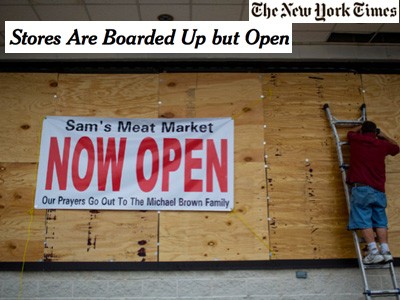The ongoing civil unrest in Ferguson, Mo., sparked by the police shooting of teenager Michael Brown, seems a bit of a stretch as a premise for business coverage.
But with no end in sight to the confrontations and headlines – especially in light of another shooting on Tuesday in the St. Louis area – and involvement by the U.S. Department of Justice and comments by President Obama, it might behoove financial writers everywhere to address some tangential storylines.
Clearly the root issues behind the strife in Missouri – from race to income/wealth inequality to the militarization of community police forces — are some of the most profound of our time and I’m not suggesting they are fodder for frivolous business features. But realistically the nature of some of the violence does raise questions among consumers, small businesspersons and corporate entities about how they would fare under similar circumstances.
For example, images of damaged and looted stores must raise questions among merchants in your audience about their own liability; you might want to emulate this St. Louis Business Journal piece, “Most business insurance covers riots,” and offer a primer on what’s covered, and what’s not, in residential and commercial hazard policies. Also talk with sellers of insurance in your neck of the woods; what are they hearing from the financial institutions whose products they represent in terms of guidance?
“Images of damaged and looted
stores must raise questions
among merchants in your
audience about their
own liability.”
One trade publication already is out with a piece called “The riots in Ferguson: What agents need to know,” and I would not be surprised if insurance offices in locales far from Missouri are getting inquiries from small-business clients looking for a checkup on the limits and terms of their current policies.
In addition to after-the-fact coverage, you could look into demand for preventatives such as security systems. Vandalism is a fear of business owners everywhere – it’s the second-ranked concern voiced by owners in a recent survey commissioned by security service firm ADT.
And, as always after events that involve fear and adversarial relationships, “gun sales are soaring.” What are gun and ammunition sellers in your area seeing in response to civil unrest that comes amid a somber period of global political and military strife, including a highly partisan upcoming U.S. election season. Another way events like those in Ferguson can ripple out beyond geographic borders is via securities markets.
Here’s a fresh opinion piece from MarketWatch.com about “Why Ferguson should matter to investors,” and appears to make points about the economic, social and community ramifications when large local employers (in the case of Ferguson, TWA and Anheuser-Busch) go out of business or are whisked away by mergers – leaving behind places like dollar stores and fast-food joints where the job opportunities will never promise the upward mobility of the long-gone manufacturing, transportation and other employers.
The above notion might be an opportunity for you to take a look at the economic fallout from the departure of any large employers from your region; how are the former employees faring and how has the loss of such jobs rippled out through the community in terms of poverty, crime, migration, the ability of residents to support vibrant small businesses, and so on. Here’s a University of California-Davis pimer, “Finding Poverty Statistics,” that might help you find the historical data you’ll need for context on such a story.











